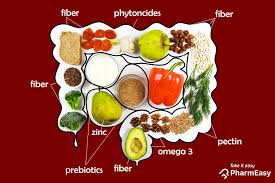The Importance of a Healthy Gut Diet
Our gut plays a crucial role in our overall health and well-being. A healthy gut is essential for proper digestion, nutrient absorption, and even immune function. One way to support a healthy gut is through a nutritious diet that promotes good gut bacteria and reduces inflammation.
Key Components of a Healthy Gut Diet:
- Fibre: Foods rich in fibre, such as fruits, vegetables, whole grains, and legumes, help promote the growth of beneficial bacteria in the gut.
- Probiotics: Foods like yogurt, kefir, sauerkraut, and kimchi contain probiotics that introduce good bacteria into the gut, aiding in digestion and immune function.
- Prebiotics: Prebiotic foods like garlic, onions, leeks, and bananas serve as fuel for the beneficial bacteria in the gut, helping them thrive.
- Healthy Fats: Omega-3 fatty acids found in fish, flaxseeds, and walnuts can help reduce inflammation in the gut and support overall digestive health.
- Avoiding processed foods: Processed foods high in sugar, unhealthy fats, and artificial additives can disrupt the balance of gut bacteria and lead to inflammation.
Benefits of a Healthy Gut Diet:
A diet that supports a healthy gut can have numerous benefits for your overall health. These include improved digestion, better nutrient absorption, strengthened immune system, reduced inflammation throughout the body, and even potential mood enhancements due to the gut-brain connection.
By incorporating more fibre-rich foods, probiotics, prebiotics, and healthy fats into your diet while avoiding processed foods whenever possible, you can help maintain a diverse and balanced microbiome in your gut – leading to better health outcomes in the long run.
Remember that everyone’s digestive system is unique. It’s essential to listen to your body’s signals and make adjustments based on how different foods make you feel. Consulting with a healthcare professional or nutritionist can also provide valuable insights tailored to your specific needs.
Top 5 FAQs About Maintaining a Healthy Gut Diet
- What is a healthy gut diet?
- What foods should I eat to promote a healthy gut?
- How do probiotics benefit gut health?
- Are there specific foods that can harm gut health?
- Can a healthy gut diet improve overall well-being?
What is a healthy gut diet?
A healthy gut diet is a nutrition plan that focuses on promoting the balance of beneficial bacteria in the gut while reducing inflammation and supporting overall digestive health. It typically includes foods rich in fibre, probiotics, and prebiotics to nourish the gut microbiome. Incorporating a variety of fruits, vegetables, whole grains, fermented foods, and healthy fats can help maintain a diverse and thriving community of gut bacteria. By prioritising these nutrient-dense foods and avoiding processed foods high in sugar and unhealthy fats, a healthy gut diet aims to improve digestion, enhance nutrient absorption, boost immune function, and reduce inflammation throughout the body.
What foods should I eat to promote a healthy gut?
To promote a healthy gut, it is essential to focus on incorporating foods that support good gut bacteria and overall digestive health. Include plenty of fibre-rich foods like fruits, vegetables, whole grains, and legumes in your diet to promote the growth of beneficial bacteria in the gut. Probiotic-rich foods such as yogurt, kefir, sauerkraut, and kimchi introduce good bacteria into the gut, aiding in digestion and immune function. Additionally, consuming prebiotic foods like garlic, onions, leeks, and bananas can serve as fuel for the beneficial bacteria in your gut. Incorporating healthy fats from sources like fish, flaxseeds, and walnuts can also help reduce inflammation in the gut. Avoiding processed foods high in sugar and unhealthy fats is crucial as they can disrupt the balance of gut bacteria. By focusing on a variety of these nutrient-dense foods while limiting processed options, you can create a diet that promotes a diverse and balanced microbiome for a healthier gut.
How do probiotics benefit gut health?
Probiotics play a vital role in supporting gut health by introducing beneficial bacteria into the digestive system. These live microorganisms help maintain a healthy balance of gut flora, which is essential for proper digestion and immune function. By populating the gut with good bacteria, probiotics can aid in breaking down food, absorbing nutrients, and preventing the overgrowth of harmful bacteria. Additionally, probiotics have been shown to reduce inflammation in the gut and promote overall digestive wellness. Including probiotic-rich foods like yogurt, kefir, and fermented vegetables in your diet can help support a diverse microbiome and contribute to better gut health.
Are there specific foods that can harm gut health?
Certain foods can indeed have a negative impact on gut health. Highly processed foods high in sugar, unhealthy fats, and artificial additives can disrupt the balance of gut bacteria and contribute to inflammation in the digestive system. Additionally, foods that some individuals may be sensitive to, such as gluten or dairy products, can also cause gut issues for those with intolerances or sensitivities. It’s important to be mindful of your diet and pay attention to how different foods affect your digestive system in order to support a healthy gut microbiome.
Can a healthy gut diet improve overall well-being?
A healthy gut diet can indeed significantly improve overall well-being. The gut is often referred to as the “second brain” due to its impact on various aspects of health beyond just digestion. By nurturing a diverse and balanced microbiome through a diet rich in fibre, probiotics, prebiotics, and healthy fats while avoiding processed foods, individuals can experience improved digestion, enhanced nutrient absorption, strengthened immune function, reduced inflammation, and even potential mood benefits. A healthy gut is closely linked to overall health and vitality, making it essential to prioritise gut health as a key component of one’s wellness routine.

